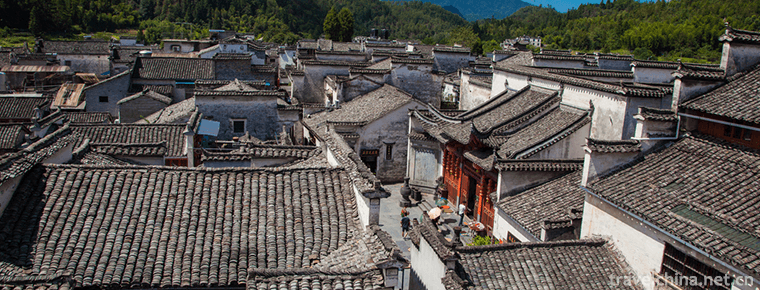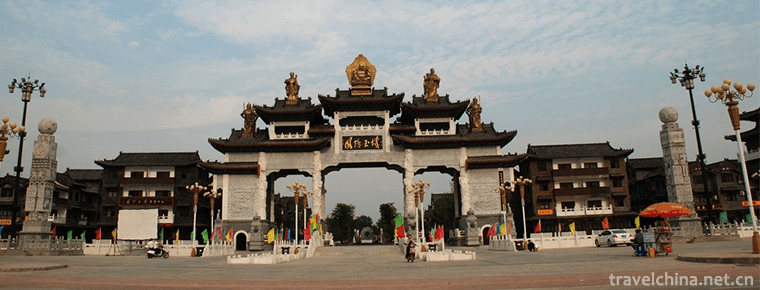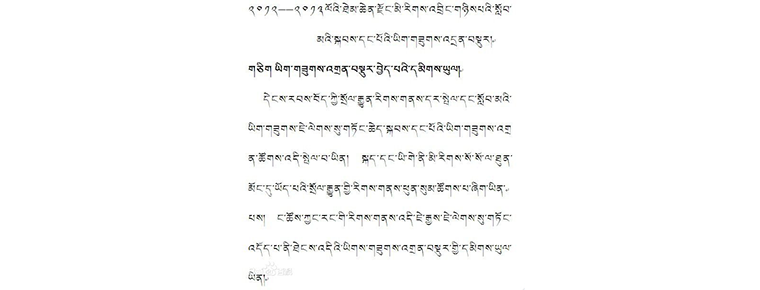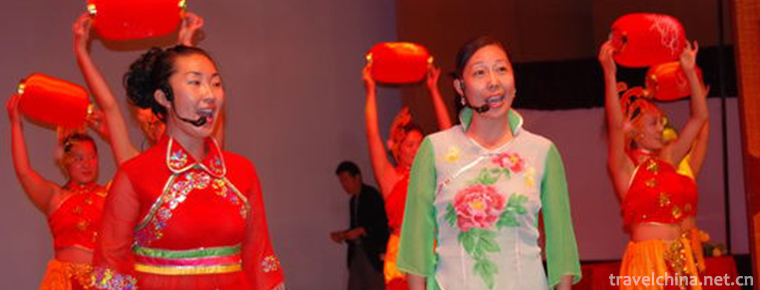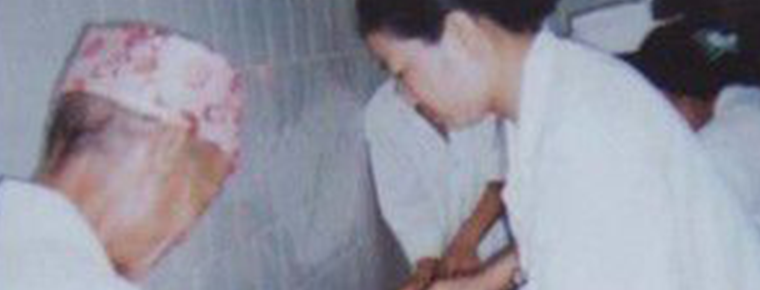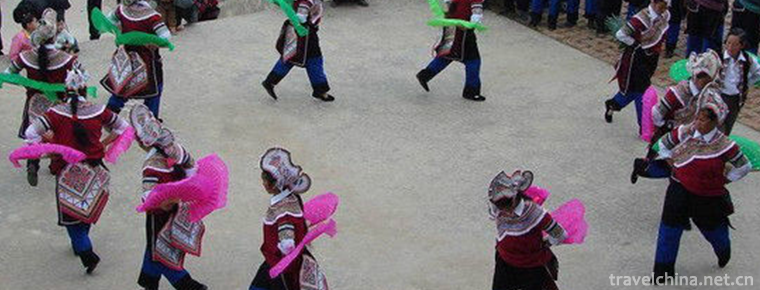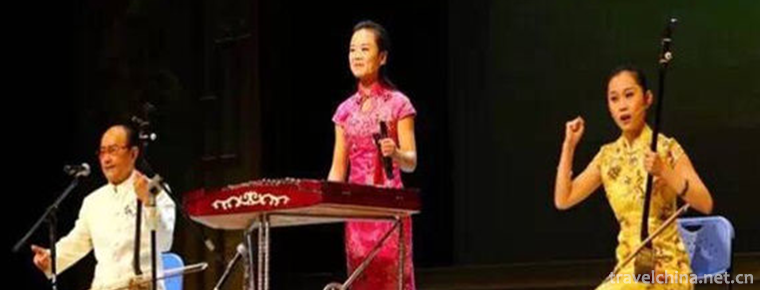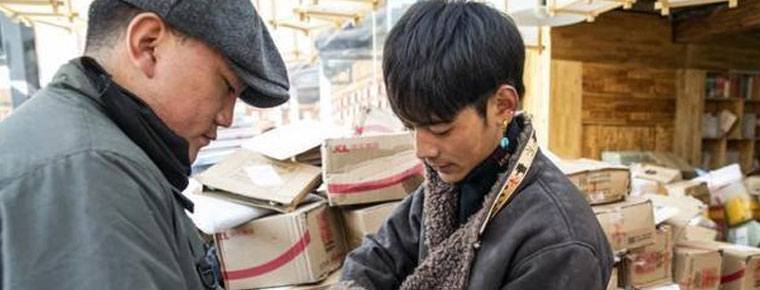Yongkang Drum Ci
Yongkang Drum Ci
Yongkang Drum Ci is a rap art in Yongkang area of Zhejiang Province. It belongs to the form of singing and talking, which is mainly composed of singing. Because of the use of local dialect performance, so the main spread of the local opera, is a very model opera, rarely familiar with the outside world, the history of singers are mostly blind artists, and mostly men, is a means of livelihood to beg. In addition to Yongkang, the neighboring areas of Dongyang, Pan'an and Wuyi are also popular in urban and rural areas. The accompaniment instrument of Yongkang Drum Ci is relatively simple, adding a wax ruler to a basin drum.
On May 23, 2011, the "Yongkang Drum Ci" declared by Yongkang City, Zhejiang Province, was approved by the State Council and listed in the third batch of national intangible cultural heritage list.
historical origin
Yongkang Drum Ci is one of the ancient operas, which originated from the Southern Song Dynasty. But Yongkang Drum Ci is a traditional art of singing and singing in Yongkang dialect. The rhyme is vivid and easy to understand. When singing, there is a drum basin on the right leg, a drum seal in the right hand, and a bamboo board in the left hand. The rhythm is clear. Its traditional repertoire includes "Dahongpao", "Shuihongling", "Xiaoxian Fang", "Double Golden Line" and more than 10, mainly showing the shortcomings of parents and the affection of children. Yongkang drum lyrics, commonly known as "singing antiquities" or "singing stories". Historically, singers were mostly blind artists and mostly male, which was a means of making a living for begging. In addition to Yongkang, the neighboring areas of Dongyang, Pan'an and Wuyi are also popular in urban and rural areas. The accompaniment instrument of Yongkang Drum Ci is relatively simple, adding a wax ruler to a basin drum. The basin drum, also known as "flat drum", resembles the flat drum used in the northern book drum. It is composed of six pieces of yellow sandalwood, about 5 centimeters in height. It is said that it was originally made up of a piece of black gold donated by each of the six officials. It also represents six officials of the Ministry of Rites, the Ministry of Household Affairs, the Ministry of Military Affairs, the Ministry of Punishment, the Ministry of Engineering and the Ministry of Officials. When performing, according to the changing plot of the story and the need of accompaniment, artists can hit the ever-changing drums as a foil for story telling and singing. La Chi, also known as "clapper board" and "sandalwood board", belongs to percussion instruments. It consists of two mahogany boards, also known as "mother-child board" or "Yin-yang board". It is handed down by the artist as a gift from Uncle Cao Guo, one of the eight immortals.
artistic characteristics
Yongkang Drum Ci, also known as "Singing Ancient Stories", has been circulated in Yongkang, Wuyi, Pan'an and parts of Lishui in Jinhua, especially Yongkang and Wuyi.
The performance of Yongkang drum lyrics is sitting and singing in a single voice, alternating between rap and singing, mainly singing. The lyrics are mainly composed of seven-character sentences and long and short sentences. They are relatively free and have the rhyme of Yongkang dialect. There are different types of tunes, such as , . The accompaniment instruments are two or three percussion instruments, without orchestral accompaniment, of which the flat drum with a diameter of about one foot is the main instrument.
Representational repertoire
Yongkang Drum Ci was formed in the middle of Qing Dynasty. In 1950, according to artists'recollections, its teacher-teacher relationship can be traced back to Yan Afei and Lu Zhenbei in Tongzhi and Guangxu years of Qing Dynasty. Its traditional repertoire includes "Dahongpao", "Shuihongling", "Xiaoxianfang", "Double Golden Line" and more than 10. In the early days of the founding of the People's Republic of China, Yongkang's drum lyrics were performed vigorously, including famous artists such as Lv Qizhao and Ye Baochang, and a large number of new repertoires such as "Three Ages'Enemy" and "Blood and Tears" were transplanted and adapted. By the middle and late twentieth century, Yongkang Drum Ci had declined and was in danger except for a few elderly people.
Inheritance Significance
Yongkang Drum Ci has become a pearl of local folk art in the middle of Zhejiang Province because of its unique regional cultural flavor, flexible and convenient performance, regardless of venues and other characteristics. However, with the continuous departure of drum CI artists, this ancient traditional art is gradually falling into the dilemma of being on the verge of being lost.

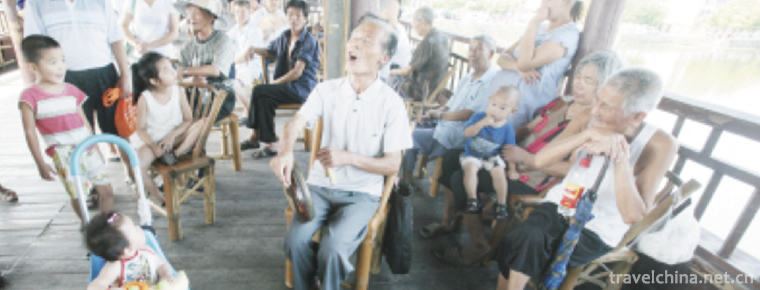
-
sate noodles
The only disciple chef Wang Daquan who teaches Shacha Noodle recipe by the master of Southern Fujian cuisine Yang Jibo inherits the tradition and makes it flourish. The main ingredients of Shacha sauc.
Views: 170 Time 2018-11-02 -
Ancient Huizhou Cultural Tourism Zone
Huangshan Ancient Huizhou Cultural Tourist Area is located in Huangshan City, Anhui Province, north of Huangshan Mountain, south of Qiandao Lake.
Views: 157 Time 2018-12-08 -
Beihai Seabed World
Beihai Seabed World is a national AAAA-level tourist attraction and national marine science education base. It is a large-scale comprehensive ocean hall which mainly displays marine organisms and inte.
Views: 180 Time 2018-12-26 -
International Jade City
International Yucheng is located in the south of Shifosi Town, Zhenping County, Henan Province, on the south side of Yuyuan Avenue, south to Liulu Highway, east to Erlong Road, north to Longxiang Road.
Views: 140 Time 2019-01-13 -
Ziweidong Scenic Area
Seeing the pronoun of the first reaction of "purple cave" to "immortal" cultivation and residence, we often enchase that fairyland dream on this name..
Views: 132 Time 2019-03-22 -
Tibetan calligraphy
Tibetan calligraphy is an important part of Tibetan culture and art. In the seventh century AD, during the Zampson Zangganbu period of Tubo, minister Tunmi Sampuza absorbed the advantages of different.
Views: 148 Time 2019-04-05 -
Changli folk songs
Changli folk song is a kind of local folk ditty inherited from generation to generation by Changli people. The content of singing can be divided into four categories: labor chant, story and legend, lo.
Views: 184 Time 2019-04-15 -
Dai Medicine Sleeping Drug Therapy
Sleeping pill therapy, one of the ten traditional Dai medicine therapies, is the third batch of national cultural heritage in Yunnan..
Views: 160 Time 2019-04-24 -
Music dance
Musical dance is popular on the South Bank of the Red River, so it is also known as "Jiangwai" Yi dance. The Yi language is called "Zai Bi", which means jumping up in pairs. .
Views: 290 Time 2019-05-11 -
Xuzhou Qinshu
Xuzhou Qinshu is a kind of opera recognized by Xuzhou local people in Jiangsu Province. Spread in Xuzhou. At first, it was a recreational activity of "playful friends" in the leisure time of.
Views: 308 Time 2019-07-09 -
Jintang Yunding mountain scenic spot
Jintang Yunding mountain is located in the middle section of Longquan Mountain in Jintang County, Chengdu. The scenic spots include Yunding mountain, Hantan ancient ferry, Jintang small Three Gorges of Tuojiang River.
Views: 203 Time 2020-11-05 -
Ding Zhen from the plateau Village
The 20-year-old Tibetan boy is from a small mountain village in Litang County, Ganzi Tibetan Autonomous Prefecture, Sichuan Province. More than 20 days ago, a photographer released a short video on the short video platform, which made Ding Zhen .
Views: 74 Time 2020-12-07

